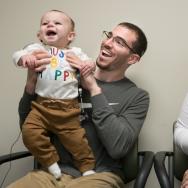Dana Suskind has performed hundreds of cochlear implant surgeries during her medical career, but there’s another number for which she’s much better known.
“The title of my first book, Thirty Million Words, is going to be my epitaph, I’m sure,” said Suskind, a professor of surgery and pediatrics at UChicago Medicine.
According to an influential study by two University of Kansas researchers, children from the lowest-income households hear thirty million fewer words by the time they turn four than children in the highest-income households. In recent years the exact size of the early language gap has been widely debated (more on that later), but whatever the figure, Suskind wants to bring it closer to zero.
In her 2015 book, Thirty Million Words: Building a Child’s Brain—Tune In, Talk More, Take Turns, Suskind promoted a simple way for parents to improve children’s chances in life: conversation. Talking more with babies and toddlers is, in her view, the single most important thing parents can do to promote cognitive development. She devised an easy shorthand for how parents and other caregivers should engage with young children: the 3Ts. They should tune in (that is, notice what interests their children), talk more (narrate everyday activities using rich vocabulary), and take turns (treat the child as a conversation partner).
It made for an appealing argument, the kind of tidy solution that policy makers and media outlets like. Beginning in the 2010s, and especially after the release of her book, Suskind became a spokesperson for speech, giving frequent interviews and lectures about the 3Ts. At the same time, the research center she cofounded, the TMW Center for Early Learning + Public Health, was developing and testing new interventions to promote early language development.
But as the years went on, Suskind began to see that her tidy solution was less tidy than she had hoped.
“I had thought the answers lay in the actions and beliefs of individual parents, in their knowledge and behavior,” Suskind writes in her new book, Parent Nation: Unlocking Every Child’s Potential, Fulfilling Society’s Promise.
Conducting more research with parents in Chicago made clear that individual knowledge and behavior were not enough to surmount the obstacles many families faced. How do you tune in when you live in a homeless shelter? How do you talk more when you are incarcerated?
Parents were doing their best, but “real life would intrude, again and again and again,” Suskind writes. “The larger realities of a family’s circumstances—their work constraints, economic stresses, and mental health as well as the injustices and bad luck they are subject to—all matter as much as the 3Ts for healthy brain development.”
Those circumstances, she argues, stem from a systemic failure to support all parents (but especially low-income parents) in the developmentally crucial early years of their children’s lives. This, too, is a gap that needs closing.
Suskind never intended to write a second book. “I thought I was one and done,” she said. But seeing how her first book connected to a “larger reckoning that we’re having at this moment in time, that context matters and that structure matters—it just compelled me.” She still believes in the power of tuning in, talking more, and taking turns. The bigger challenge is creating a world where all parents can more easily do those three essential things.
Deaf language and community
Suskind’s big ambitions grew from something small: the cochlea, a tiny snail-shell-shaped organ in the inner ear that helps transmit auditory information to the brain for processing. A malfunctioning cochlea, whether from injury or genetics, can result in severe or profound hearing loss.
During her surgical fellowship at Washington University in St. Louis, Suskind met Rodney Lusk, a pioneer in performing cochlear implant surgeries for children. The small devices include electrodes that are placed in the cochlea and used to stimulate the auditory nerve, giving patients access to sound and spoken language. For children with certain kinds of deafness, cochlear implant surgery—especially in the first year of life, when the brain is most capable of learning how to process sound—can have a transformational effect.
Cochlear implants are divisive within the Deaf community, which views deafness not as a disability but as a culture with its own rich language and distinctive way of life. Some believe it is unethical for parents—particularly hearing parents—to make such a momentous decision on their deaf child’s behalf, saying it deprives children of the opportunity to learn sign language and connect with Deaf culture.
Suskind is quick to point out that she is a proponent of children learning sign language, which she regards as equal to spoken language in every sense. “Language is language is language,” she said.
Among her deaf patients born to deaf parents fluent in American Sign Language, many grow up bilingual, both signing and speaking. But for the 90 percent of deaf children born to hearing parents who aren’t fluent signers, she believes that providing access to sound offers the best chance of developing strong language skills.
As Suskind’s surgical career progressed, she began to notice that her patients growing up in hearing households had uneven outcomes when it came to those language skills. In an ideal scenario, a child who receives a cochlear implant early in life can pick up spoken language the same way a hearing child would: By listening to it, discerning its meaning, and eventually repeating it. This happened for some of her patients, who in time developed language skills on par with their peers. But others faltered.
Why, Suskind wondered, could two children in hearing households who received cochlear implants at the same age fare so differently? Something was missing, and Suskind viewed it as a professional duty and an extension of her Hippocratic Oath to understand what it was. “For me,” she said, “doing right by my patient couldn’t end in the operating room.”
In search of the answer to this mystery, she enrolled in a self-directed course in early childhood development. Suskind found mentors in “the Susans”: Susan Goldin-Meadow, the Beardsley Ruml Distinguished Service Professor in Psychology and the Committee on Human Development, and Susan C. Levine, the Rebecca Anne Boylan Distinguished Service Professor of Psychology.
Levine was surprised to be sought out by a colleague from across Ellis Avenue—and a surgeon, no less: “I think most people get into a groove with their career, and don’t branch out in that way.”
Levine was more than happy to share what she knew. One of her specialties is language development in the aftermath of childhood brain injury. Her research has shown that environmental factors (that is, family support, education, access to specialized therapy) have an underappreciated role in outcomes for these patients. Injury, even serious injury, can be overcome under the right circumstances.
Why can children thrive despite serious brain damage? It’s the same reason cochlear implant surgery works better in younger children than older ones: neuroplasticity, which is the ability of the brain to form and reorganize connections in response to the environment.
Unlike our other vital organs, our brains are relatively unformed at birth. Roughly 80 percent of brain development occurs from ages zero to three. During this window, the brain is uniquely capable of adapting to circumstance. If the left hemisphere is damaged, the right can take over its usual functions; if a congenitally deaf child gets a cochlear implant, the brain can learn to interpret sound.
That’s the good news. The bad news is that this window begins to close after age three. Neural connections left unformed at this time may never develop. No other period in a child’s life holds such power and such peril.
For all children
Suskind was auditing Goldin-Meadow’s Introduction to Child Development course when she first heard about the 30-million-word study. Like nothing else she’d encountered, it helped explain the uneven outcomes she saw in her cochlear implant patients. For those who struggled to develop language skills after surgery, the “something missing,” Suskind realized, was caregiver conversation.
The study’s authors, Betty Hart and Todd Risley, observed 42 families—13 of high socioeconomic status (SES), 10 of middle SES, 13 of lower SES, and six on public assistance—once a month for an hour from the ages of about seven months to three years.
They found that not only did the children vary in how much language they heard at home, but they also heard different kinds of language. Low SES children heard more prohibitions (“Stop it!”) than affirmations (“Good job!”) in addition to less chitchat. Hart and Risley argued that this difference in quantity and kind of early language exposure contributed to the academic achievement gap between high and low SES children later in life.
Hart and Risley’s study is not airtight. Forty-two families is an awfully small number from which to draw sweeping conclusions, and the research was conducted 40 years ago. The finding of a 30-million-word gap has not been replicated—a more recent study put the number closer to four million. Some scholars object to Hart and Risley’s use of white professional families as the implicit standard for the “correct” level of language exposure.
Suskind acknowledges these shortcomings. (In 2019, she changed the name of her research center from Thirty Million Words to the TMW Center for Early Learning + Public Health.) Yet she also feels that Hart and Risley started an important conversation about the influence of caregiver interactions on children’s later outcomes. It, along with lots of other research in child development, suggested that her implant patients’ diverging outcomes and the socioeconomic achievement gap had the same origin story—a lack of sufficiently rich language exposure before age three. This discovery spurred Suskind to action.
Why weren’t parents talking? Over time, Suskind and her colleagues identified two major explanations. The first was a lack of awareness: As compared to high SES parents, low SES parents knew less about the importance of parent-child conversation for cognitive development. The second was more practical: Parents didn’t always know what brain-building interaction looked like in action.
The TMW Center has devised programs to address both obstacles. They’ve created short videos in both English and Spanish about early brain development that they and partners show at pediatrician visits. And their signature program, from which the 3Ts emerged, involves 12 home visits over six months, during which TMW staff provide caregivers with information about and strategies for promoting cognitive development. A 2018 paper found that the program successfully increased parent knowledge, child language exposure, and conversational turn taking.
But the interventions weren’t a magic wand. The home visiting program gave TMW staff an intimate feel for the challenges families face. In Parent Nation, Suskind writes about one mother, Sabrina, who lost her job after taking time off work to care for her diabetic husband. The family was evicted from their apartment and spent the next two years in a homeless shelter.
During her TMW visits, Sabrina learned that she should keep a calm tone and avoid issuing too many directives when talking to her two-year-old son. But the shelter was a stressful and sometimes dangerous place for a young child. Yelling might not have been ideal for his growing brain, but it kept him safe. What, Sabrina wanted to know, should she do instead? Suskind is the first to admit she has no good answer to this question.
Suskind’s attentiveness to families facing adversity comes from both professional experience and personal tragedy. In 2012 her husband, Don Liu, a pediatric surgeon at the University, died rescuing two drowning boys in Lake Michigan. All at once, Suskind was a single parent to three grieving children. In the aftermath of this cataclysm, family and friends formed a protective cocoon around them, but Suskind recognizes that in other circumstances—with less financial stability or less social support—things might have spun out of control.
That Liu died saving the lives of children will never compensate for the loss, but it offers something to hold on to.
“He is still with me every day,” Suskind said. The love he gave to his own children, and the patients he cared for, is a model she tries to follow: “I know we can do that for all children.”
—This is an excerpt from a story first published by UChicago Magazine. Read the full story to learn more about Prof. Dana Suskind’s latest work, and what she hopes to see in a “parent nation.”


